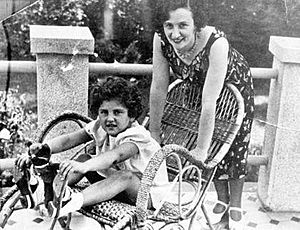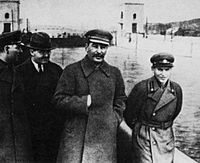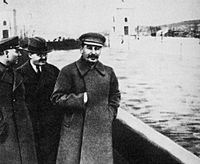Nikolai Yezhov facts for kids
Quick facts for kids
Nikolai Yezhov
|
|
|---|---|
|
Николай Ежов
|
|
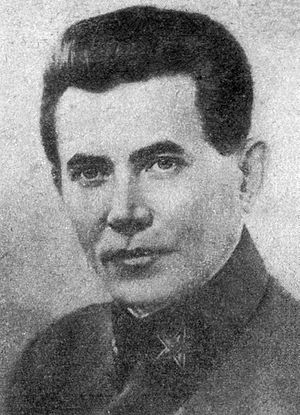 |
|
| People's Commissar for Internal Affairs (NKVD) |
|
| In office 26 September 1936 – 25 November 1938 |
|
| Premier | Vyacheslav Molotov |
| Preceded by | Genrikh Yagoda |
| Succeeded by | Lavrentiy Beria |
| Chairman of the Party Control Commission of the Central Committee | |
| In office 1935–1939 |
|
| Preceded by | Lazar Kaganovich |
| Succeeded by | Andrey Andreyev |
| People's Commissar for Water Transport (NKVT) | |
| In office 8 April 1938 – 9 April 1939 |
|
| Premier | Vyacheslav Molotov |
| Preceded by | Nikolay Pakhomov |
| Succeeded by | None (position abolished) |
| Full member of the 17th Central Committee | |
| In office 10 February 1934 – 3 March 1939 |
|
| Candidate member of the 17th Politburo | |
| In office 12 October 1937 – 3 March 1939 |
|
| Member of the 17th Secretariat | |
| In office 1 February 1935 – 3 March 1939 |
|
| Personal details | |
| Born |
Nikolai Ivanovich Yezhov
1 May 1895 St. Petersburg, Russian Empire |
| Died | 4 February 1940 (aged 44) Moscow, Russian SFSR, Soviet Union |
| Cause of death | Execution by shooting |
| Citizenship | Soviet |
| Political party | Russian/All-Union Communist Party (Bolsheviks) (1917–1939) |
| Spouses |
Antonia Titova
(m. 1919; div. 1930)Yevgenia Feigenberg
(m. 1930; died 1938) |
| Children | 1 (adopted) |
| Signature |  |
| Nicknames | Ежевика (Blackberry) Iron Hedgehog |
Nikolai Ivanovich Yezhov (born May 1, 1895 – died February 4, 1940) was an important government official in the Soviet Union. He was the head of the NKVD, a powerful government agency, from 1936 to 1938. This time was known as the Great Purge. During this period, Yezhov was involved in removing many people from their jobs and arresting others. However, he later lost the trust of Joseph Stalin, the leader of the Soviet Union. Yezhov was arrested and admitted to various wrongdoings. He was executed in 1940.
Contents
Early Life and Career
Nikolai Yezhov was born on May 1, 1895. His official Soviet biography says he was born in Saint Petersburg, Russia. However, he later said he was born in southwest Lithuania. His mother, Anna Antonovna Yezhova, was Lithuanian.
Yezhov only finished elementary school. From 1909 to 1915, he worked in different jobs, like a tailor's helper and a factory worker. He served in the Imperial Russian Army from 1915 to 1917. In May 1917, he joined the Bolsheviks in Vitebsk, just before the October Revolution. During the Russian Civil War (1917–1922), he was a soldier in the Red Army.
After 1922, Yezhov started working in the Soviet political system. He often served as a secretary for different regional committees of the Communist Party. In 1927, he moved to a department that handled party records and assignments. He became the Deputy People's Commissar for Agriculture from 1929 to 1930. In November 1930, he was put in charge of several important departments within the Communist Party. In 1934, he became a member of the Central Committee. The next year, he became a secretary of the Central Committee. From 1935 to 1939, he also led the Central Commission for Party Control.
Personal Life
Nikolai Yezhov married Antonina Titova in 1917, but they later divorced. He then married Yevgenia Feigenburg, who worked in Soviet publishing. She was known for being friends with many writers and actors.
Yezhov and Yevgenia adopted a daughter named Natalia, who was an orphan. After Yevgenia and Yezhov died, Natalia was sent back to an orphanage. She was no longer allowed to use the Yezhov last name and became known as Natalia Khayutina.
Leading the NKVD
A major change in Yezhov's career happened in 1934. At that time, Sergei Kirov, a Bolshevik leader, was murdered. Joseph Stalin used this event as a reason to remove many people from power. Yezhov was chosen to help with this task. He was then promoted and eventually became the head of the NKVD.
On September 26, 1936, Yezhov became the People's Commissar for Internal Affairs, which meant he was the head of the NKVD. He also became a member of the Central Committee. This happened after the previous head, Genrikh Yagoda, was removed from his position.
Yezhov seemed to be a very loyal supporter of Stalin. He was also not originally part of the state security agencies. This made him the person Stalin wanted to lead the NKVD and remove people who might oppose the government. One of Yezhov's first jobs from Stalin was to investigate and prosecute Yagoda, the former NKVD chief.
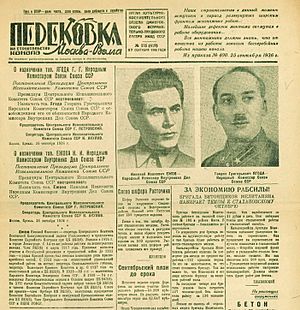
Under Yezhov's leadership, the Great Purge became very intense between 1937 and 1938. Many members of the Soviet government and military officers were removed from their jobs. They were either sent to prisons, exiled to labor camps called the Gulag in Siberia, or executed. A large number of ordinary Soviet citizens were also accused of disloyalty, often with very little proof. They were punished in similar ways to meet certain quotas for arrests. The number of people in the Gulag grew greatly under Yezhov, almost tripling in just two years. Many of these prisoners died from hunger or exhaustion.
Final Days
On August 22, 1938, Lavrenty Beria was named Yezhov's deputy in the NKVD. Beria had managed to survive the Great Purge himself. Earlier in 1938, Yezhov had even ordered Beria's arrest. However, Beria quickly went to Moscow to see Stalin in person. Beria convinced Stalin to let him live and reminded Stalin how well he had followed orders in his region. In a turn of events, Yezhov was the one who lost power, and Beria became the new NKVD chief.
In the following months, Beria slowly took over control of the NKVD from Yezhov, with Stalin's approval. Yezhov knew that Stalin often removed and replaced his main assistants. Yezhov had been the person who helped arrange many of these removals before.
Yezhov understood that Beria's growing influence with Stalin meant his own downfall was coming soon.
On November 25, Yezhov officially asked to be removed from his job as People's Commissar for Internal Affairs. Beria took over as the head of the NKVD. Yezhov attended his last important political meeting on January 29, 1939.
Arrest and Trial
On April 10, Yezhov was arrested and put in the Sukhanovka prison. His arrest was kept very secret from the public and even from most NKVD officers.
In his statement, Yezhov admitted to various crimes against the state. These included being inefficient, stealing government money, and working with foreign spies.
On February 2, 1940, Yezhov had a trial. It was held in secret. Yezhov said he was not a spy or a terrorist. He stated that he would rather die than tell lies.
After the secret trial, Yezhov was told he had been sentenced to death. He was executed by firing squad on February 4, 1940.
Yezhov's body was quickly burned, and his ashes were placed in a common grave at Moscow's Donskoye Cemetery. His execution remained a secret for a long time.
Images for kids
See also
 In Spanish: Nikolái Yezhov para niños
In Spanish: Nikolái Yezhov para niños
 | Misty Copeland |
 | Raven Wilkinson |
 | Debra Austin |
 | Aesha Ash |


